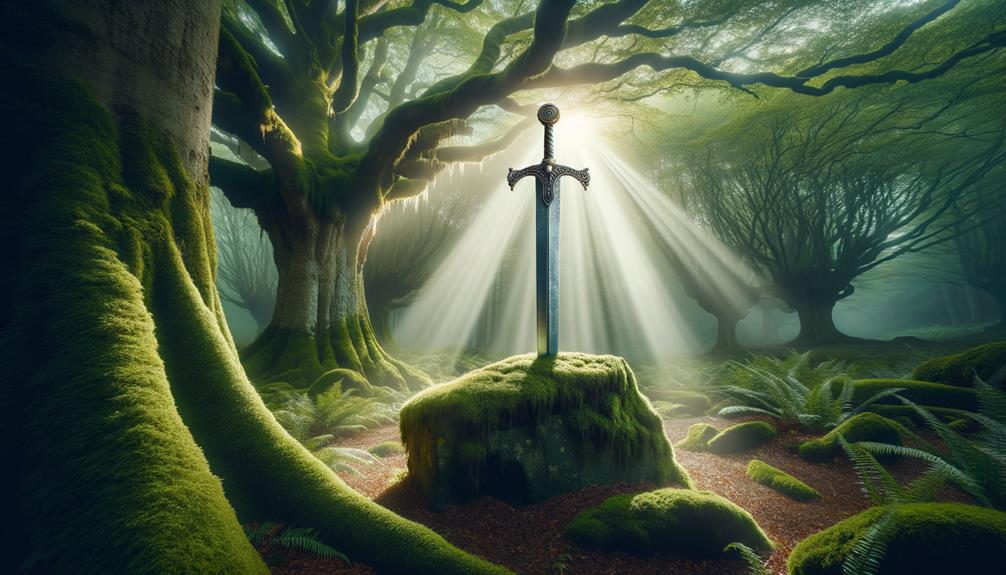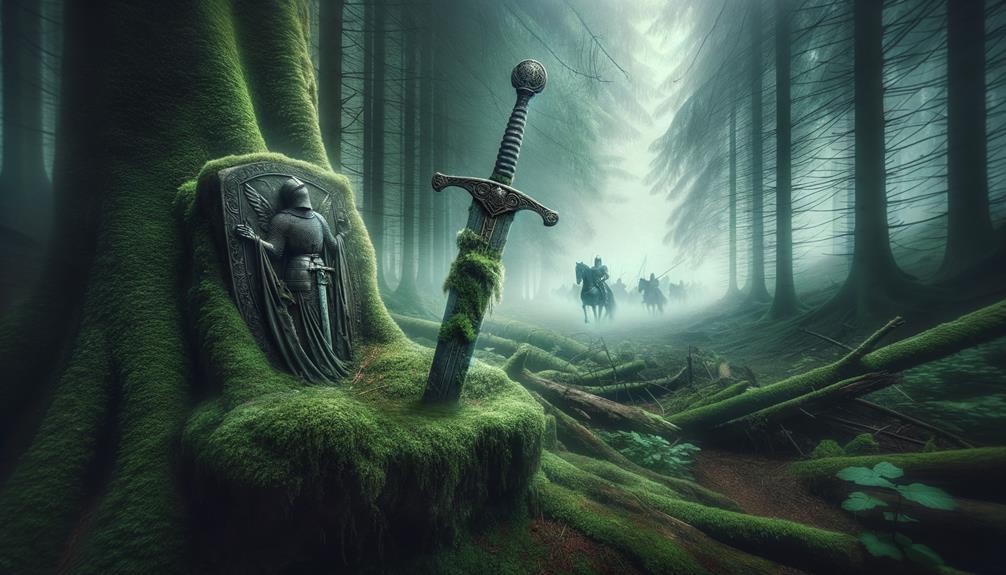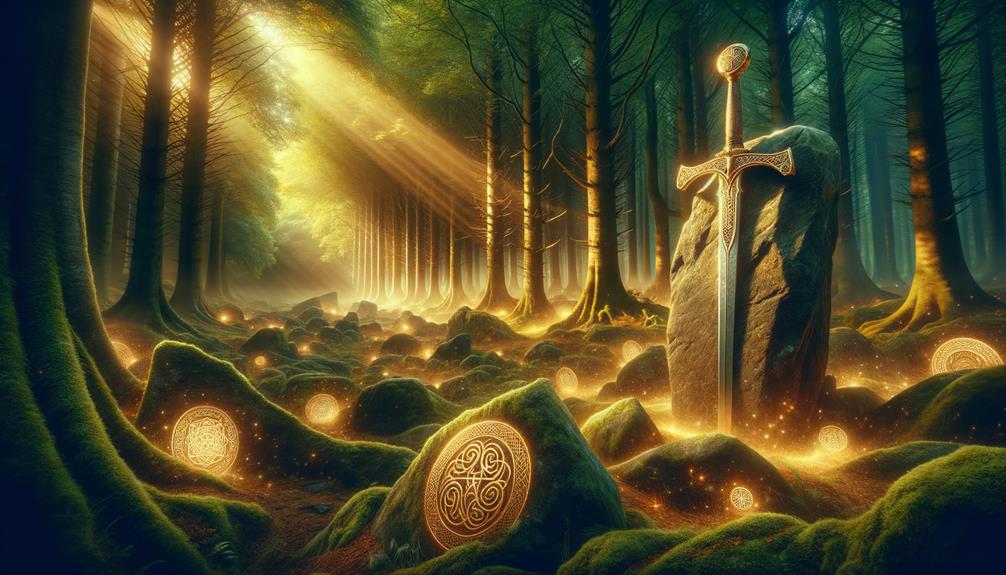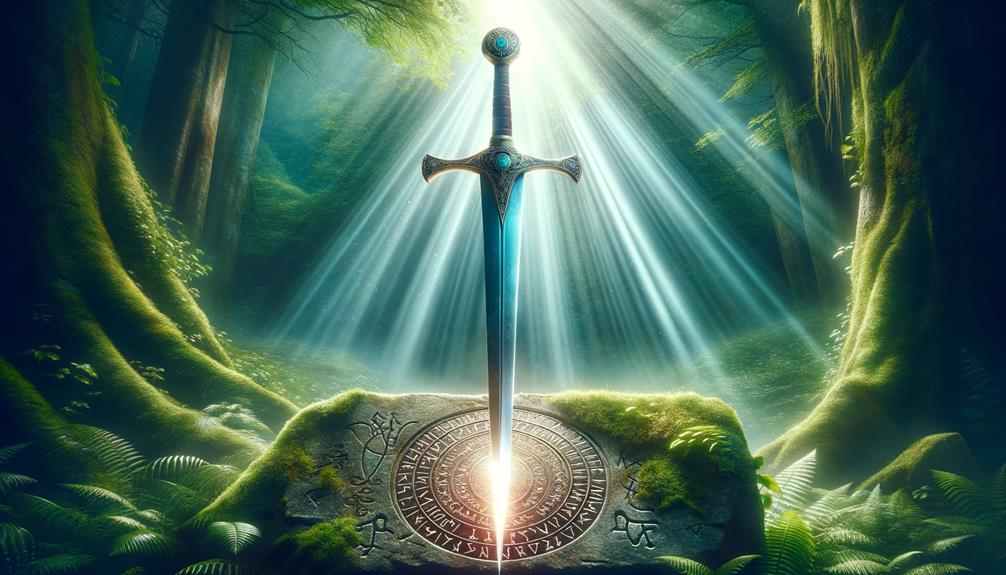Excalibur, the legendary sword of King Arthur, carries immense symbolic weight and a lasting impact. Birthed from Celtic folklore and cemented by Geoffrey of Monmouth's chronicles, this gleaming blade embodies virtues like heroism and chivalry that inspire generation after generation. Its portrayal in literature, art, and film sparks our imaginations, leaving us pondering: what aspects of the Excalibur legend remain so compelling?
The sword's significance stems from its representation of rightful leadership blessed by divine authority. More than just a weapon, it signifies the strong moral principles Arthur upheld as the rightful ruler of Britain. This symbolic resonance continues captivating audiences, reminding us of the timeless values of just rulership.
Contemporary retellings reinterpret Excalibur for modern audiences while respecting its rich mythological roots. The enduring popularity proves this ancient tale's universal themes transcend era and culture. Though its origins lie in mist-shrouded Celtic lore, Excalibur's message of upholding honor and justice remains relatable across societies.
By examining Excalibur through a literary lens, we uncover layers of meaning beneath the shimmering facade. This iconic sword ultimately represents humanity's aspirations for benevolent leadership guided by integrity – an ideal that resonates powerfully across eras. Excalibur's legend lives on, inspiring us to uphold virtue even in turbulent times.
Origins and Legends
The legend of King Arthur's sword, Excalibur, weaves tales of power and destiny dating back to ancient Celtic bards. Geoffrey of Monmouth, a chronicler of Arthurian lore, initially named it Caliburn, likely inspired by the Irish blade Caladbolg. Over centuries, this evolved into the iconic Excalibur, a name signifying 'cut-steel' as per Malory, reflecting its formidable might.
Two narratives surround Excalibur's origins: in one, Arthur pulls the sword from a stone, proving his royal birthright; in another, the mystical Lady of the Lake bestows it upon him. These tales not only etch Excalibur into Arthurian legend but also cast Arthur as a heroic archetype destined for greatness, his claim to power validated by divine forces.
Symbolic Significance

Excalibur, King Arthur's legendary sword, stands for more than mere power and might. In the tales woven around this mythical blade, Excalibur signifies Arthur's rightful claim to rule, marking him as the chosen leader destined for greatness. Its shimmering steel speaks of divine favor bestowed upon Arthur, setting him apart from ordinary men.
The stories amplify Excalibur's symbolic weight, portraying it as more than just a weapon – a vessel channeling the virtues Arthur's reign embodied. When Arthur wields this sword, he becomes the epitome of heroism and chivalry, an icon the Knights of the Round Table aspire to emulate.
Beyond its physical form, Excalibur represents the lofty ideals Arthur fought to uphold – justice, honor, nobility. Across myriad adaptations, the sword's symbolic resonance endures, reflecting humanity's timeless quest for these virtues. With each swing of Excalibur's blade, we witness the triumph of the heroic spirit over adversity.
Historical Evolution

Excalibur's tale has evolved into a pivotal part of medieval folklore, transitioning from faint rumors of ancient sorcery to a cornerstone of Arthurian legend. Early medieval literature first documented Excalibur's mystical origins, with supernatural events cementing Arthur's destiny. The sword in the stone symbolized divine kingship, revealing Arthur as the rightful sovereign when he alone could draw it out. This act signified not mere strength but a higher, mystical authority.
Then there's the captivating story of the Lady of the Lake bestowing Excalibur upon Arthur in dire times. This enigmatic figure emerging from watery depths solidified the sword's connection to otherworldly forces and Arthur's role as the chosen land's protector. For centuries, Arthurian tales have portrayed these dual origins, underscoring Excalibur's significance as both a mighty weapon and symbolic icon.
As a cultural symbol transcending its mythic roots, Excalibur embodies leadership ideals and national identity. Generations have been fascinated by its richly symbolic narrative blending history and myth, forever enshrining Excalibur in legendary lore.
Cultural Impact

Excalibur's legend and symbolism have seeped into countless literary works, movies, and art pieces, leaving an indelible mark on our cultural imagination. As King Arthur's sword, Excalibur carries the weight of heroism and chivalry, representing ideals that have resonated with audiences across generations. This mythical blade transcends its function as a weapon; it stands for the epitome of noble virtues and righteous authority.
Consider the following to grasp Excalibur's profound cultural impact:
- Literature: Medieval tales to contemporary novels have featured Excalibur as a central element, exploring the hero's journey and the quest for honor.
- Film: Reimaginations across decades have added new layers to the sword's mythos with each cinematic interpretation.
- Art: Visual artists have immortalized Excalibur in paintings and sculptures, visually echoing its symbolic narrative.
- Symbolism: Excalibur represents the ultimate moral and ethical standards, a timeless icon of true leadership.
- Scholarship: Academics delve into Excalibur's role in Arthurian lore, enriching our understanding of its historical and cultural significance.
Modern Representations

The once mythical Excalibur, a legendary sword etched into modern storytelling, continually dazzles audiences with its magical properties. Contemporary retellings craft the iconic blade as a symbol of extraordinary prowess and divine protection, echoing King Arthur's heroic saga.
Films like 'Monty Python and the Holy Grail' and 'The Sword in the Stone' breathe new life into Excalibur's essence, transcending its physical form. Video games and television shows reimagine the sword in novel contexts where fresh heroes arise to wield its might.
Excalibur's intrigue stems from its power to inspire and transform, bridging ancient legend with modern imagination. Its prevalence across literature, music, and product branding underscores its permeating cultural influence. Each adaptation revitalizes the sword's mythic legacy, reminding us of its timeless mystique.
Through these engaging modern narratives, Excalibur remains a celebrated emblem of valor and enchantment, captivating our collective consciousness anew with each retelling.
Frequently Asked Questions
Why Is Excalibur so Important to King Arthur?
Excalibur represents my destined kingship, drawn from stone or gifted by the Lady of the Lake. This legendary sword symbolizes my heroic journey and ideals of chivalry that defined my reign.
What Are the Two Legends About King Arthur and Excalibur?
Two tales immortalize Arthur's kingship and Excalibur. In one, he claims sovereignty by extracting the blade from stone – his destiny fulfilled. Another recounts the Lady of the Lake gifting him the sword, signifying divine blessing. These legends underscore Arthur's noble birthright and approval from mystical realms.
What Happened to King Arthur's Excalibur?
Most Arthurian tales mention Excalibur's return to the mystical Lady of the Lake after Arthur's death. Bedivere cast the legendary sword back into the waters, marking the iconic era's end and signifying profound change. This symbolic act resonates deeply, encapsulating closure while hinting at new beginnings. The enduring allure of this final scene underscores Excalibur's profound legacy within Arthurian mythology.
What Is the Legend of King Arthur's Sword?
The tale of King Arthur's blade, Excalibur, fuels wonder. Its symbolism transcends just power and fate – it's the embodiment of a hero rising up, persevering through hardship. Whether drawn from stone or gifted by a mystical lady, Excalibur remains an enduring legend steeped in valor.


